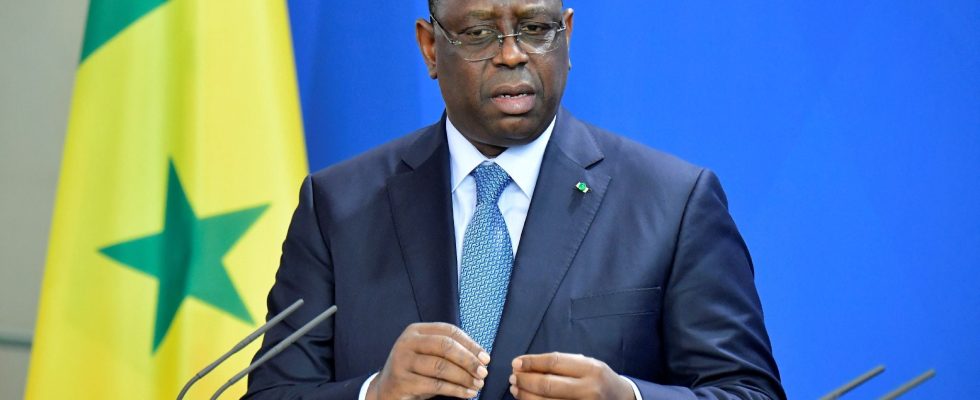The ax fell this Saturday, February 3: there will be no presidential election in Senegal on February 25. In a very rapid televised address, President Macky Sall declared that he had repealed his decree setting the date of the election. His statement comes just a few hours before the official opening of the electoral campaign for the presidential vote, for which twenty candidates were to compete.
“I will initiate an open national dialogue, in order to create the conditions for a free, transparent and inclusive election,” said Macky Sall, without giving a date. In recent days, the debate about postponing the election has intensified within the country’s various political assemblies. A large part of the opposition, however, positioned itself against it, accusing the government of a maneuver to gain time when it feared losing.
Until now, the electoral process undertaken was unprecedented and its result very uncertain, with 20 candidates engaged in the race for the first round. At the end of January, the Constitutional Council excluded dozens of contenders from the ballot. Among them, two opposition leaders: the anti-system candidate Ousmane Sonko, in prison since July 2023 – notably for calling for insurrection and disqualified by the Council following a conviction for defamation in a separate case – and Karim Wade, minister and son of ex-president Abdoulaye Wade (2000-2012), who took too long to renounce his dual French nationality.
For L’Express, Babacar Ndiaye, political scientist director of research and publication of the Wathi think tank, based in Dakar, Senegal, analyzes the ins and outs of this unprecedented announcement.
L’Express: What reasons pushed Macky Sall to announce the postponement of the elections 20 days before the vote?
Babacar Ndiaye : The President’s speech was very brief, barely three minutes. He declared that he had “signed the decree of February 3, 2024 repealing the decree of November 26, 2023 setting the presidential election for February 25, 2024”. For now, this means that the planned election is simply canceled. There is no question of a postponement yet.
As for what justifies his decision, Macky Sall mentioned a crisis between the Senegalese Parliament and the Constitutional Council (body which validates eligible candidates for elections, Editor’s note). And for good reason: a commission of inquiry was opened two days ago by the National Assembly to shed light on the alleged corruption of two judges of the Constitutional Council concerning the question of the ineligibility of certain candidates. This commission of inquiry was initiated by deputies from an opposition party, the PDS (Senegalese Democratic Party), whose candidate Karim Wade, son of former president Abdoulaye Wade, was not validated because he did not renounce his French nationality in time (in Senegalese law, a candidate in the presidential election cannot be binational, Editor’s note).
Is this a valid reason to cancel the election in your opinion?
We were a few hours away from the official campaign, which was scheduled to begin at midnight. In a split second, the whole process stopped. Is there really a crisis between the two institutions that are the Constitutional Council and the Parliament? Only the future will tell us. One of the two accused judges of the Constitutional Council filed a complaint for defamation.
In any case, this decision is resounding. The president also announced the establishment of a national dialogue to create the conditions for a free, transparent and inclusive election. In recent years, we have experienced various “national dialogues”. But for what results?
Could this decision hide political inclinations on the part of those in power?
The party at the origin of this commission of inquiry mentioned by President Macky Sall is the PDS of Karim Wade. They find a certain interest in this postponement of the election since it would allow them to get back into the game. However, deputies from the presidential movement helped to set up this commission of inquiry while their candidate, the current Prime Minister Amadou Ba, is accused of being the corruptor of the Constitutional Council.
In recent days, we have also seen people close to Macky Sall and government ministers say that they were in favor of postponing the presidential election for at least six months. What does the presidential majority gain by postponing the election? If we follow the logic of the opposition parties, the chances of its candidate would decrease and it would therefore seek to gain time. There is a real difficulty in explaining why the presidential party, whose candidate is accused of corruption, helped set up the commission of inquiry.
Since 1963, never has a presidential election by direct universal suffrage been postponed. This paves the way for a period of uncertainty…
This is a dangerous precedent. Senegal has always been seen as a democratic model in a region where many instabilities remain. The Senegalese, to prove it, claim this mythical phrase: “the presidential election is always held on the due date”. Today, Macky Sall put an end to it. The future is very uncertain. What will the oppositions do? What will the Senegalese people do? I believe that we are not immune to protest movements.
We are in an unprecedented political sequence in Senegal, with consequences that we will see in the hours and days to come. Everything is possible. Basically, after the deadly demonstrations of June 2023, people said to themselves that they were going to resolve things at the ballot box. But today, there are no more elections, and Macky Sall’s mandate officially ends on April 2, 2024.
.
